League of Olympic Swim Legends: Mary T Meagher Tops 200 Butterfly Podium With Ada K and Susie O
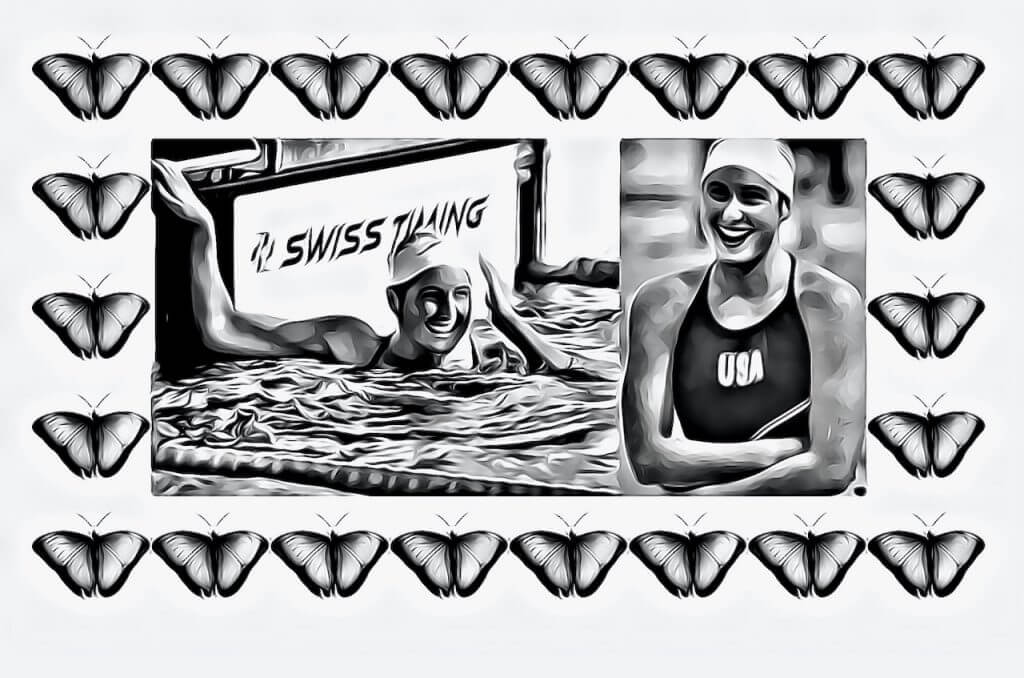
What would have unfolded had Tokyo 2020 gone ahead as planned this week – and where would it all have fit in the thread of Olympic swim legends and pioneers like Mary T Meagher, Ada Kok and Susie O’Neill? To mark the eight days over which the Tokyo 2020 Olympic Games would have unfolded had the coronavirus pandemic not forced postponement, the team at Swimming World is filling the void with a Virtual Vision Form Guide and League of Olympic Swimming Legends.
Day 5, event 3 – Madam Butterfly X 3 …
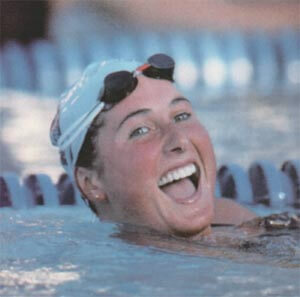
Mary T. Meagher – Photo Courtesy: Swimming World Archives
Women’s 200m Butterfly
The Podium
- Mary T Meagher (USA)
- Ada Kok (NED)
- Susie O’Neill (AUS)
The Other Finalists (Listed Alphabetically):
- Mireia Belmonte (ESP)
- Jiao Liuyang (CHN)
- Karen Moe (USA)
- Otylia Jędrzejczak (POL)
- Misty Hyman (USA)
Our Lane 9* place goes to the only other Champion left beyond those above who was not coached by a mentor linked to doping:
- Summer Sanders (USA)
* – in our series, we will use Lane 9 to add an athlete whose story reflects extraordinary situations of different kinds, including being deprived by those who fell foul of anti-doping rules or by political decisions or, indeed the Olympic program, as well as simple facts such as “he/she was the only other title winner who claimed gold in a WR but didn’t make out top 8 on points”
All-Time Battle Of Olympic Swim Legends Goes To Mary T Meagher
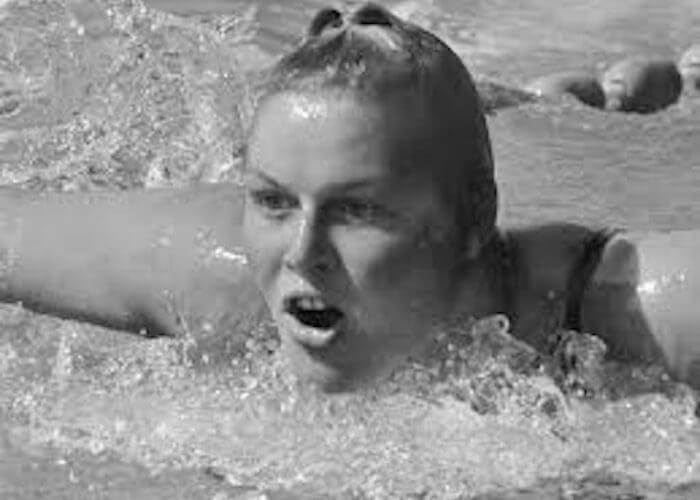
Ada Kok – Photo Courtesy: Ada Kok
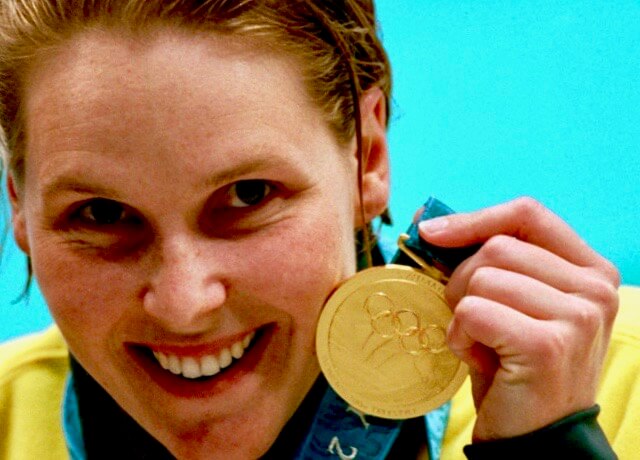
Susie O’Neill – 200 freestyle gold – Photo Courtesy: Swimming Australia
This event produced one of the most decisive victories in the Legends Series, as the original Madame Butterfly routed her rivals. Few athletes have dominated an event the way Mary T Meagher ruled over the 200 butterfly, an event in which her times from the late 1970s and early 1980s remain competitive with the athletes of the current era.
Meagher set five world records during her career and held the global standard for 21 years, spanning 1979-2000. Although her first Olympic chance was thwarted by the United States boycott of the 1980 Games in Moscow, she earned Olympic glory by winning both butterfly events at the 1984 Games in Los Angeles. Four years later, she added a bronze medal in the 200 fly in Seoul.
The Netherlands’ Ada Kok picked up the silver medal, her highlight the 1968 Olympic crown she won in the event’s debut for women. Known as ‘the gentle giant’, Ada K set four world records in the 200 fly and dropped the standard by almost five seconds over a two-year span. At the 1964 Olympics, where Kok would have contended for gold had the 200 fly been on the schedule, the Dutchwoman won silver in the 100 butterfly.
Also nicknamed Madame Butterfly, Australia’s Susie O’Neill earned the bronze medal. O’Neill was the woman who took down Meagher’s longstanding record and captured Olympic gold in 1996. At the 2000 Games, O’Neill was the overwhelming favorite to repeat, but took silver as American Misty Hyman registered one of the biggest upsets in Olympic swimming history.
Mary T. Meagher – A Magnificent, Dominant Swim … And A Olympic Record That Would Stand For 16 Years
Mary T Meagher – A Madam Butterfly For All Ages:
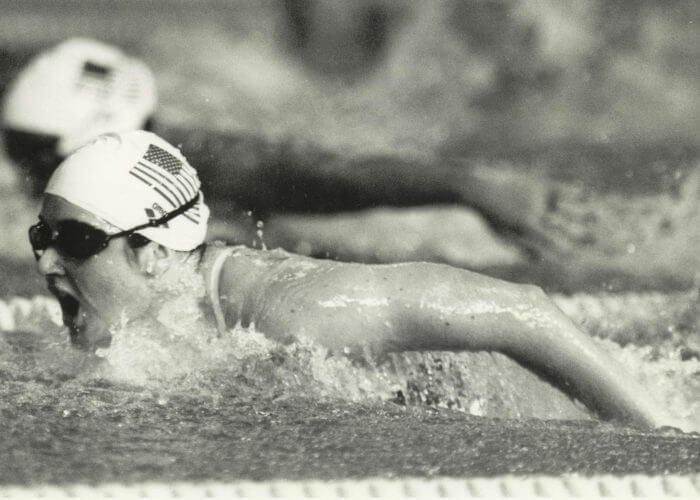
Mary T. Meagher Photo Courtesy: Tony Duffy/ ISHOF Archive
1984 Los Angeles – Women 200m Butterfly – Athletes: 29; Nations: 18
- 2:06.90or Mary T Meagher USA
- 2:10.56 Karen Phillips AUS
- 2:11.91 Ina Beyermann FRG
2:11.98 Nancy Hogshead USA
2:12.33 Samantha Purvis GBR
2:12.57 Naoko Kume JPN
2:15.38 Sonja Hausladen AUT
2:17.39 Cornelia van Bentum NED
Date of final: August 4, 1984
After missing out in 1980 because of boycott, American Mary T Meagher thrilled a home crowd with victory in both the 100m and 200m butterfly at the Games in Los Angeles.
In the 200m final, Meagher was a class apart, cruising inside her own world-record pace at 50m (29.30 to 29.53) and 100m (1:01.00 to 1:01.41). Down the third length, the greatest butterfly swimmer the world had ever seen faded from record pace but left her rivals a league behind. She turned into the last length on 1:34.08, the crown standing to cheer her home to a victory that would surely have been hers in 1980 but for boycott.
Meagher’s 2:06.90 effort remained the Olympic record until the Games in 2000 and would have won her a medal at all Games, including the 2004 Olympics in Athens. At the time, it was also her third career best, the third best performance ever behind her own two top efforts and granted her the swiftest seven efforts over 200m butterfly all-time.
Karen Phillips, of Australia, was more 3.66sec back for the silver by her own comfortable margin over Ina Beyermann, of West Germany. The margin of victory for Mary T Meagher was the biggest, by far, in the history of the event back to 1968 – and remains the biggest win by far to this day.
Locked out of the medals by 0.07sec was Nancy Hogshead, who proved herself one of the most versatile athletes of the Games, winning the 100m freestyle (with an historic shared victory – see 100m freestyle, 1984), taking silver in the 200m medley and winning two other gold medals in relays. She later became an advocate for safe sport and athlete empowerment and has been instrumental in shaping legislation pending approval and designed to keep rogues out of the sports realm.
Also just outside the medals by 0.42sec was Britain’s Sam Purvis, who would later work as a swim teacher and coach in Australia.
Ada Kok – The Olympic Rollercoaster Ends In Gold
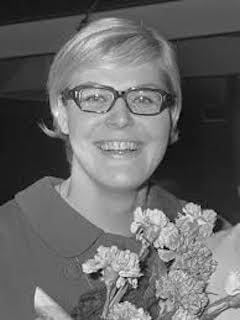
Ada Kok – Photo Courtesy: Ada Kok
1968 Mexico City – Women 200m Butterfly – Athletes: 21; Nations: 16
- 2:24.7or Ada Kok NED
- 2:24.8 Helga Lindner GDR
- 2:25.9 Ellie Daniel USA
2:26.2 Toni Hewitt USA
2:27.9 Heike Hustede FRG
2:31.7 Diane Giebel USA
2:33.2 Margaret Auton GBR
2:34.3 Yasuko Fujii JPN
Date of final: October 24, 1968
Ada Kok was described as “the gentle giant” of swimming. The 1968 Olympic 200m butterfly champion and holder of more butterfly world records – nine – than any other female swimmer, also attracted the following appraisal from an American observer:
“… she looks like a football fullback and swims like a fastback”.
Born in Amsterdam, Kok was Madam Butterfly long before the advent of Mart T Meagher the advent of made her Olympic debut with two silver medals at the 1964 Olympic Games in Tokyo, four years before the introduction of the 200m butterfly. Over 100m, she arrived in Tokyo the favourite, as world record holder on 1:05.1, but Sharon Stouder, an American who won three gold medals (100m butterfly, 4×100 freestyle and medley relay) and a silver (100m freestyle behind Dawn Fraser) claimed the global standard in 1:04.7, to Kok’s second-place 1:05.6.
In relays, Kok often turned depressing deficits into medal-winning opportunities for the Orange squad, and in 1964 her efforts brought Holland from outside the reach of the podium to a place from which Erica Terpstra, fourth in Dawn Fraser’s last 100m freestyle triumph, could race to the silver medal for the Dutch in a European record of 4:37.0 behind America’s 4:33.9 World record.
The lowest and then highest moments of Kok’s fine career unfolded at the 1968 Olympic Games in Mexico. On October 17, she and her medley relay teammates finished seventh behind four other European quartets a year after winning the European title. Then, on October 21, Kok entered the final of the 100m butterfly as world record holder on 1:04.5 (a time she clocked in 1965 and one that would survive until 1970) but emerged with the same time, 1:06.2, as bronze medal winner Susan Shields (USA) behind champion Lynette McClements (AUS) and Ellie Daniel (USA).
Shields was awarded bronze on judgement of the naked eye, Kok locked out. She was distraught but it was not in her nature to be defeated, especially when the reaction to her disappointment in the 100m included being ignored by the Dutch team blazerrati. Fuel for the next swim.
Three days later, having clocked the best heats time over 200m, she confirmed her standing as one of the all-time greats of butterfly swimming: third at the turn 1.4sec behind East German Helga Lindner, Kok took the race on down the third length and while Linder fight back in the closing 20m, the Dutchwoman refused to yield.
A final push for the wall granted her the crown by 0.1 over Lindner in an Olympic record of 2:24.7, with Daniel third in 2:25.9. Lindner is the older cousin of Renate Vögel, the silver medal winner for the GDR in the 4x100m medley four years later and first world champion over 100 and 200m breaststroke in 1973 and later an escapee who would reveal details of the systematic doping of athletes in the GDR.
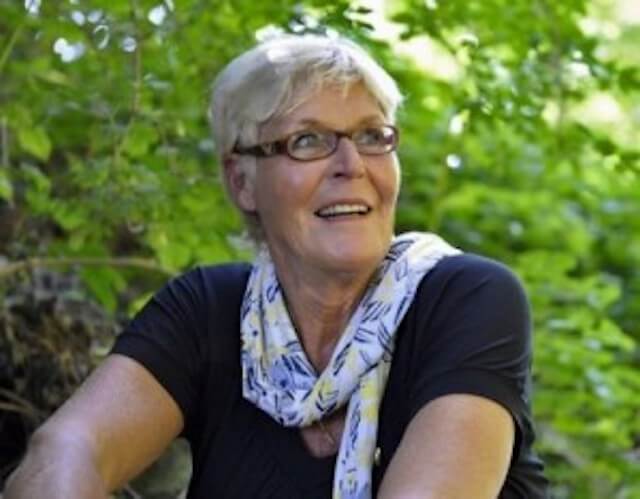
Ada van der Linden – Photo Courtesy: Ada vd Linden
So delighted was Kok with her triumph that at a reception at the Dutch Embassy in Mexico she accepted a bet to go and bounce on the ambassador’s bed – and got caught in the act. The ambassador simply smiled.
In 1962 and again in 1966, Kok won the European 100m butterfly crown and helped Holland to gold in the 4x100m medley relays. At the 1966 championships in Utrecht, she also gave a hint of the talent the world rarely saw when she finished second in the 400m freestyle, half a second behind Claude Mandonnaud, of France.
The same year, Kok helped to open the International Hall of Swimming Fame in Fort Lauderdale, Florida (currently being renovated, see below), and was inducted as an honoree 10 years later. Over six years, she held 13 European metres records (nine on butterfly and four in the Dutch medley relay).
Her retirement did not mean absence from the elite pool: after the Games in Mexico Kok enjoyed a stellar career as the crucial link between swimmers and their suits as the face of Speedo on the pool deck. A popular celebrity in the Netherlands, Kok once sold her car to a passing gypsy and returned home sporting new glasses. Her long-suffering husband asked: “Where’s the car?” Lifting her glasses up and down, Kok replied: “You’re looking at it.”
Susie O’Neill Leads An Aussie 1-2 Ahead Of A Pool Of Problems
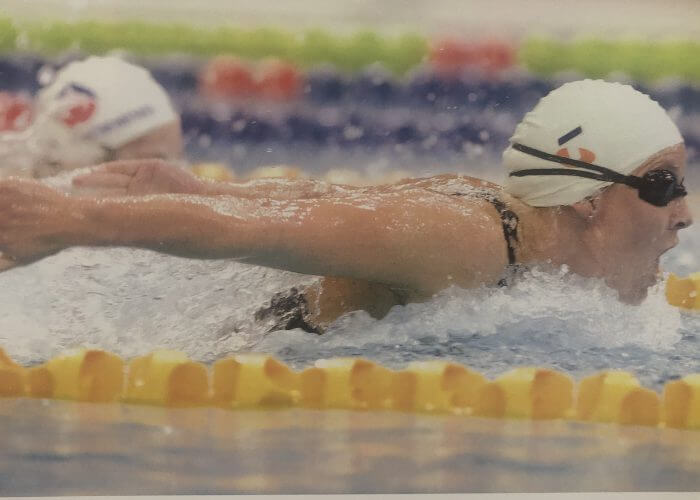
Susie O’Neill Courtesy Darrin Braybrook (Swimming Australia)
1996 Atlanta – Women 200m Butterfly – Athletes: 42; Nations: 35
- 2:07.76 Susan O’Neill AUS
- 2:09.82 Petria Thomas AUS
- 2:09.91 Michelle Smith-De Bruin IRL
2:10.26 Qu Yun CHN
2:10.70 Liu Limin CHN
2:11.40 Jessica Deglau CAN
2:11.93 Mika Haruna JPN
2:11.96 Trina Jackson USA
Date of final: July 26, 1996
For the fourth Games in succession, the world record of Mary T Meagher (USA), a 2:05.96 from 1981, stood as solid as the day on which it had entered the books.
Summer Sanders (USA), the 1992 champion, did not qualify at US trials, while Susan O’Neill (AUS) was the only 1992 finalist to make it back to the final eight, four years on. Wang Xiahong, silver medallist in 1992 had gone and in her place were two members of the Chinese squad that went by the name of the Golden Flowers at the 1994 World Championships in Rome.
Liu Limin and Qu Yun took gold and silver more than two seconds ahead of O’Neill in Rome a month before seven members of the Chinese team tested positive for steroids at the start of an avalanche of adverse test results from China. After the shame of 1994, the Chinese were not nearly as mighty in Atlanta, though Liu and Qu made the 200m butterfly final.
The hunt for medals was led from the blocks by O’Neill and teammate Petria Thomas, who turned at 50m in 28.54 and 29.05, with Michelle Smith de Bruin (IRL) third in 29.16, Liu and Qu on 29.24 and 29.32. By halfway, O’Neill had broken clear and turned in 1:00.66, 0.75sec inside the world-record pace set by Meagher in 1981. Smith de Bruin turned in 1:01.38, with Thomas on 1:01.79. Down the third length, Meagher’s monument resisted the challenge once more, O’Neill turning in 1:33.76, 0.07sec outside world-record pace.
By that last turn, Smith de Bruin, transformed from a long-term mediocre player at elite level to a triple champion in Atlanta before her fall from grace on grounds of manipulating a doping-test sample, had got much closer, on 1:34.45. Thomas was now a second back. O’Neill, coached by Scott Volkers, came home in 34.00 for a 2:07.76 victory, the second-fastest performance in Olympic history behind Meagher’s 1984 effort of 2:06.90.
Down the last length, Thomas put in a 34.37, an effort that even the born-again Smith de Bruin, a less technically efficient swimmer, could not resist. The Irishwoman clocked 35.46 and had to settle for bronze, shutting out the two Chinese challengers.
There was irony in the mix: the very day that the Chinese World Championship squad plunged the sport into deeper doping crisis in January 1998, when four team members tested positive for diuretics, Smith de Bruin supplied a urine sample at home in Ireland that would lead to her downfall. The sample contained enough alcohol in it to suggest that, had the substance passed through the digestive system in the normal way, it would have killed her. Smith de Bruin was suspended for manipulating a test sample and retired while serving her period of shame.
Head Australia coach Don Talbot said of O’Neill:
“She’s made of steel, but looking at her you’d think that she was made only of sugar and spice and all things nice. She’s a quiet achiever, but boy she fights to win.”
O’Neill and Thomas would return to the podium four years later in the same order, though a different foe finished ahead of them, Misty Hyman, who makes out all-time line-up for this exercise.



